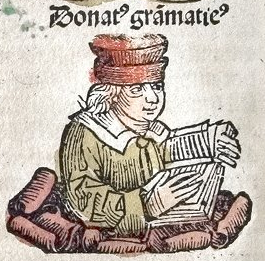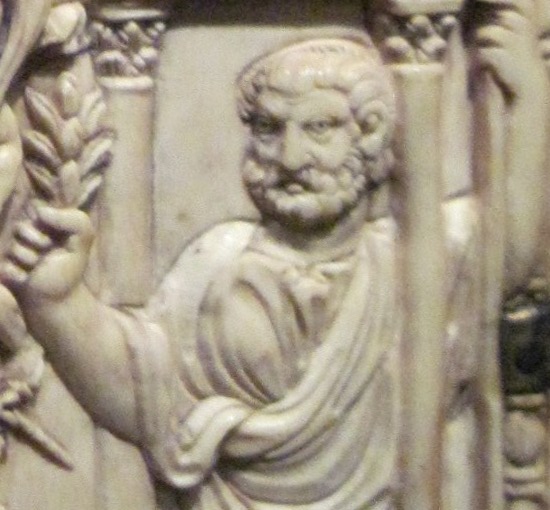|
Maurus Servius Honoratus
Servius was a late fourth-century and early fifth-century grammarian. He earned a contemporary reputation as the most learned man of his generation in Italy; he authored a set of commentaries on the works of Virgil. These works, ''In tria Virgilii Opera Expositio'', constituted the first incunable to be printed at Florence, by Bernardo Cennini, in 1471. In the ''Saturnalia'' of Macrobius, Servius appears as one of the interlocutors; allusions in that work and a letter from Symmachus to Servius indicate that he was not a convert to Christianity. Commentary on Virgil The commentary on Virgil ( la, In Vergilii Aeneidem commentarii) survives in two distinct manuscript traditions. The first is a comparatively short commentary, attributed to Servius in the superscription in the manuscripts and by other internal evidence. The second class derive from the 10th and 11th centuries, embed the same text in a much expanded commentary. The copious additions are in contrasting style to ... [...More Info...] [...Related Items...] OR: [Wikipedia] [Google] [Baidu] |
Servius
{{hndis ...
Servius is the name of: * Servius (praenomen), the personal name * Maurus Servius Honoratus, a late fourth-century and early fifth-century grammarian * Servius Tullius, the Roman king * Servius Sulpicius Rufus, the 1st century BC Roman jurist See also *Servius Sulpicius Galba (other) Servius Sulpicius Galba may refer to: * Servius Sulpicius Galba (consul 144 BC) * Servius Sulpicius Galba (consul 108 BC) * Servius Sulpicius Galba (praetor 54 BC), assassin of Julius Caesar * Galba, born Servius Sulpicius Galba, Roman emperor from ... [...More Info...] [...Related Items...] OR: [Wikipedia] [Google] [Baidu] |
Bernardo Cennini
Bernardo Cennini (; 1414/5 – c. 1498) was an Italian goldsmith, sculptor and early printer of Florence. As a sculptor he was among the assistants to Lorenzo Ghiberti in the long project producing the second pair of doors—the ''Doors of Paradise''—for the Battistero di San Giovanni. He produced the first book printed at Florence. The painter and author of a famous book on the crafts, Cennino d'Andrea Cennini, was a member of the same Florentine family. Works of sculpture and goldsmith Representing his output as a sculptor-goldsmith is a cache of his sculptures in silver that are preserved in the Museo dell'Opera del Duomo, Florence. They include a high relief combining two New Testament episodes, ''The Announcement to Zachariah and the Visitation'', which were Cennini's contribution to the silver altar of S. Giovanni, (formerly in the Baptistery), a project that was worked on by several generations of sculptors; the silver crosses for it are also by Cennini, and the ''corp ... [...More Info...] [...Related Items...] OR: [Wikipedia] [Google] [Baidu] |
4th-century Latin Writers
The 4th century (per the Julian calendar and Anno Domini/Common era) was the time period which lasted from 301 ( CCCI) through 400 ( CD). In the West, the early part of the century was shaped by Constantine the Great, who became the first Roman emperor to adopt Christianity. Gaining sole reign of the empire, he is also noted for re-establishing a single imperial capital, choosing the site of ancient Byzantium in 330 (over the current capitals, which had effectively been changed by Diocletian's reforms to Milan in the West, and Nicomedeia in the East) to build the city soon called Nova Roma (New Rome); it was later renamed Constantinople in his honor. The last emperor to control both the eastern and western halves of the empire was Theodosius I. As the century progressed after his death, it became increasingly apparent that the empire had changed in many ways since the time of Augustus. The two emperor system originally established by Diocletian in the previous century fell in ... [...More Info...] [...Related Items...] OR: [Wikipedia] [Google] [Baidu] |
Aeneid
The ''Aeneid'' ( ; la, Aenē̆is or ) is a Latin Epic poetry, epic poem, written by Virgil between 29 and 19 BC, that tells the legendary story of Aeneas, a Troy, Trojan who fled the Trojan_War#Sack_of_Troy, fall of Troy and travelled to Italy, where he became the ancestor of the Ancient Rome, Romans. It comprises 9,896 lines in dactylic hexameter. The first six of the poem's twelve books tell the story of Aeneas' wanderings from Troy to Italy, and the poem's second half tells of the Trojans' ultimately victorious war upon the Latins (Italic tribe), Latins, under whose name Aeneas and his Trojan followers are destined to be subsumed. The hero Aeneas was already known to Greco-Roman legend and myth, having been a character in the ''Iliad''. Virgil took the disconnected tales of Aeneas' wanderings, his vague association with the foundation of Ancient Rome, Rome and his description as a personage of no fixed characteristics other than a scrupulous ''pietas'', and fashioned th ... [...More Info...] [...Related Items...] OR: [Wikipedia] [Google] [Baidu] |
Grammarians Of Latin
Grammarian may refer to: * Alexandrine grammarians, philologists and textual scholars in Hellenistic Alexandria in the 3rd and 2nd centuries BCE * Biblical grammarians, scholars who study the Bible and the Hebrew language * Grammarian (Greco-Roman), a teacher in the second stage in the traditional education system * Linguist, a scientist who studies language * Philologist, a scholar of literary criticism, history, and language * Sanskrit grammarian, scholars who studied the grammar of Sanskrit * Speculative grammarians or Modistae, a 13th and 14th century school of philosophy * Grammarians of Basra, scholars of Arabic * Grammarians of Kufa, scholars of Arabic See also * Grammar, the structural rules that govern natural languages * '' Grammaticus'', a name used by several scholars * Neogrammarian The Neogrammarians (German: ''Junggrammatiker'', 'young grammarians') were a German school of linguists, originally at the University of Leipzig, in the late 19th century who proposed ... [...More Info...] [...Related Items...] OR: [Wikipedia] [Google] [Baidu] |
Poetic Meter
In poetry, metre ( Commonwealth spelling) or meter ( American spelling; see spelling differences) is the basic rhythmic structure of a verse or lines in verse. Many traditional verse forms prescribe a specific verse metre, or a certain set of metres alternating in a particular order. The study and the actual use of metres and forms of versification are both known as prosody. (Within linguistics, " prosody" is used in a more general sense that includes not only poetic metre but also the rhythmic aspects of prose, whether formal or informal, that vary from language to language, and sometimes between poetic traditions.) Characteristics An assortment of features can be identified when classifying poetry and its metre. Qualitative versus quantitative metre The metre of most poetry of the Western world and elsewhere is based on patterns of syllables of particular types. The familiar type of metre in English-language poetry is called qualitative metre, with stressed syllables comi ... [...More Info...] [...Related Items...] OR: [Wikipedia] [Google] [Baidu] |
Scholia
Scholia (singular scholium or scholion, from grc, σχόλιον, "comment, interpretation") are grammatical, critical, or explanatory comments – original or copied from prior commentaries – which are inserted in the margin of the manuscript of ancient authors, as glosses. One who writes scholia is a scholiast. The earliest attested use of the word dates to the 1st century BC. History Ancient scholia are important sources of information about many aspects of the ancient world, especially ancient literary history. The earliest scholia, usually anonymous, date to the 5th or 4th century BC (such as the ''scholia minora'' to the ''Iliad''). The practice of compiling scholia continued to late Byzantine times, outstanding examples being Archbishop Eustathius' massive commentaries to Homer in the 12th century and the ''scholia recentiora'' of Thomas Magister, Demetrius Triclinius and Manuel Moschopoulos in the 14th. Scholia were altered by successive copyist ... [...More Info...] [...Related Items...] OR: [Wikipedia] [Google] [Baidu] |
Aelius Donatus
Aelius Donatus (; fl. mid-fourth century AD) was a Roman grammarian and teacher of rhetoric. Works He was the author of a number of professional works, of which several are extant: *Ars maior – A commentary on Latin grammar. * Ars minor – A commentary on parts of Latin Speech. * Commentvm Terenti, Publii Terentii Comoediae Sex with preface de tragoedia et comoedia (Commentary on Terence, Six Comedies of Terence with the preface About Tragedies and Comedies) – A commentary on the playwright Terence and all Six of his plays, probably compiled from other commentaries. The preface is a commentary on the "proper" structures of Tragedies and Comedies by Donatus titled, "About Comedies and Tragedies." It has never been translated to English as parts are missing from the original manuscript. It has partially been translated to German. * Explicatio in Ciceronis De inventione (An Explanation of the Cicero's De Inventione) * Vita Vergili (Life of Virgil) is thought to be based on a l ... [...More Info...] [...Related Items...] OR: [Wikipedia] [Google] [Baidu] |
Quintus Aurelius Symmachus
Quintus Aurelius Symmachus signo Eusebius (, ; c. 345 – 402) was a Roman statesman, orator, and man of letters. He held the offices of governor of proconsular Africa in 373, urban prefect of Rome in 384 and 385, and consul in 391. Symmachus sought to preserve the traditional religions of Rome at a time when the aristocracy was converting to Christianity, and led an unsuccessful delegation of protest against Emperor Gratian's order to remove the Altar of Victory from the curia, the principal meeting place of the Roman Senate in the Forum Romanum. Two years later he made a famous appeal to Gratian's successor, Valentinian II, in a dispatch that was rebutted by Ambrose, the bishop of Milan. Symmachus's career was temporarily derailed when he supported the short-lived usurper Magnus Maximus, but he was rehabilitated and three years later appointed consul. After the death of Theodosius I, he became an ally of Stilicho, the guardian of emperor Honorius. In collaboration with ... [...More Info...] [...Related Items...] OR: [Wikipedia] [Google] [Baidu] |
Macrobius
Macrobius Ambrosius Theodosius, usually referred to as Macrobius (fl. AD 400), was a Roman provincial who lived during the early fifth century, during late antiquity, the period of time corresponding to the Later Roman Empire, and when Latin was as widespread as Greek among the elite. He is primarily known for his writings, which include the widely copied and read '' Commentarii in Somnium Scipionis'' ("Commentary on the Dream of Scipio") about ''Somnium Scipionis'', which was one of the most important sources for Neoplatonism in the Latin West during the Middle Ages; the ''Saturnalia'', a compendium of ancient Roman religious and antiquarian lore; and ''De differentiis et societatibus graeci latinique verbi'' ("On the Differences and Similarities of the Greek and Latin Verb"), which is now lost. He is the basis for the protagonist Manlius in Iain Pears' book '' The Dream of Scipio''. Name The correct order of his names is "Macrobius Ambrosius Theodosius", which is how it ap ... [...More Info...] [...Related Items...] OR: [Wikipedia] [Google] [Baidu] |
Florence
Florence ( ; it, Firenze ) is a city in Central Italy and the capital city of the Tuscany region. It is the most populated city in Tuscany, with 383,083 inhabitants in 2016, and over 1,520,000 in its metropolitan area.Bilancio demografico anno 2013, datISTAT/ref> Florence was a centre of medieval European trade and finance and one of the wealthiest cities of that era. It is considered by many academics to have been the birthplace of the Renaissance, becoming a major artistic, cultural, commercial, political, economic and financial center. During this time, Florence rose to a position of enormous influence in Italy, Europe, and beyond. Its turbulent political history includes periods of rule by the powerful Medici family and numerous religious and republican revolutions. From 1865 to 1871 the city served as the capital of the Kingdom of Italy (established in 1861). The Florentine dialect forms the base of Standard Italian and it became the language of culture throug ... [...More Info...] [...Related Items...] OR: [Wikipedia] [Google] [Baidu] |







